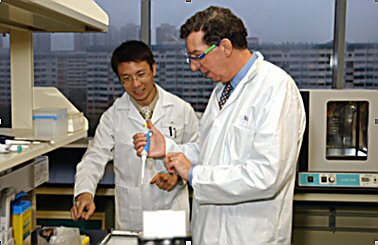There is an urgent need for methods for the detection of hazardous compounds in foods and drugs that do not involve the use of animals.
The commercial partnership between the University of Greenwich and the Kent-based innovative SME Crown Bio Systems (CBS), that successfully developed the Safe Soil Tester, is now addressing this need by developing a novel bioassay (a biological assay) composed of specially constructed strains of selected micro-organisms.
The University team is led by NRI's Prof. Raymond Coker and includes Dr Ivor Evans (Reader in Molecular Genetics, School of Science), Martin Nagler (NRI Associate), and Prof. Gordon Neal (Visiting Professor in Food Toxicology). A molecular geneticist is also being recruited. The CBS team includes Xingmin Li who has just completed his PhD studies with Prof. Coker and Dr Evans, and who is now based in CBS's new Bioscience Incubator for Toxic Hazards at the Bio-innovation Centre in the School of Chemical and Life Sciences, Nanyang Polytechnic, Singapore. The Bioscience Incubator was officially opened on 8 July 2004 by His Excellency Alan Collins, the British High Commissioner to Singapore, and will undertake research to develop and license diagnostic tools for the rapid detection of toxins in foods and drugs.

His Excellency Alan Collins and Xingmin Li at the launch of the CBS Incubator at Nanyang Polytechnic
The quality of the University-CBS partnership has been highlighted by the Director of Scientific Development of CBS, who said "The recent collaboration of Crown Bio Systems and the University of Greenwich to deliver the Safe Soil Tester was a real achievement, and I think we all recognise that its success was down to good team work, shared capability and excellent research facilities. I therefore believe that we should harness and apply this winning formula to the research and development of the bioassay for the detection of food and drug toxins." Prof Coker describes the project as "an excellent opportunity to undertake exciting, cutting-edge work and to produce a high quality, marketable product." The University of Greenwich will benefit from the successful exploitation of the IPR generated by the project.
The project is jointly funded by Crown Bio Systems and BAE Systems.

